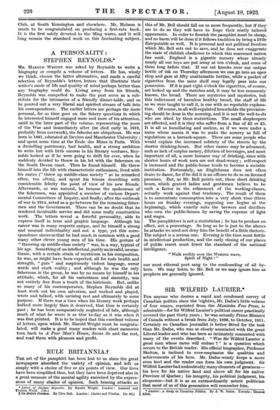A PERSONALITY : STEPHEN REYNOLDS.*
Mn. HAROLD Warm:1.r was asked by Reynolds to write a biography or compile a volume of letters. He has, wisely we think, chosen the latter alternative, and made a careful selection of Reynolds's letters, letters that illustrate their writer's mode of life and quality of mind perhaps better than any biography could do. Living away from his Mends, Reynolds was compelled to make the post serve as a substitute for the intimacies of a friendly dinner-table, and so he poured out a very liberal and spirited stream of talk into his correspondence. The earlier letters are perhaps the more personal, for as time goes on the fishery questions in which he interested himself engaged more and more of his attention, until in the later part of the volume, -representing the years of the War and 'immediately after (he died early in 1919, probably from overwork), the fisheries are ubiquitous. He was born in 1881, educated at Devizes and Mandhester University ; and spent some time at the gcole des Mines in Paris. With a dwindling patrimony, bad health, and a strong ambition to write but with little success in his literary ventures, Reynolds looked as if he were going to drift for ever, when he suddenly decided to throw in his lot with the fishermen on the South Devon coast. Then he found himself. He threw himself into the life with characteristic enthusiasm, lived with his mates (" threw up middle-class society " as he remarked often, too often), and spent his leisure describing with considerable felicity the point of view of his new friends. Afterwards, as was natural, he became the spokesman of the fishermen, was appointed a member of various Departmental Committees of Inquiry, and finally, after the outbreak of war in 1914, acted as -a go-between for the remaining fishermen and the Government. There can be no doubt that he rendered invaluable service and did some really constructive work. The letters reveal a forceful personality, able to express itself in terse and graphic language. Although his career was in many .respects unique, and he himself a strong and unusual individuality and not a type, yet this correspondence shows usthat -he 'had much in common with a good many other clever young men of his time. His gesture of " throwing up middle-class society " was, in a way, typical of his age. Something of • an intellectual,-partly an invalid, neurasthenic, with a certain strain of mysticism in his composition, he was, as might have been -expected, all for rude health and strength, " guts " and suspiciously violent language, swear words and stark reality ; and although he was the only fisherman in the group, he was by no means by himself in his attitude, which, for all his earnestness and sincerity, was not entirely free from a touch of the histrionic. But, unlike so many of his contemporaries, Stephen Reynolds did at least work out his own salvation, and worked and played, wrote and talked, with untiring zest and ultimately to some purpose. If there was a time when his literary work perhaps bulked more largely than it deserved, that time is certainly past ; he has been comparatively neglected of late, although much of what he wrote is as true to-day as it was when it was first printed. It is to be hoped that this excellent volume of letters, upon which Mr. Harold Wright must be congratulated, will make a good many readers with short memories turn back to A Poor Man's House, Seems So and the rest, and read them with pleasure and profit.


































 Previous page
Previous page